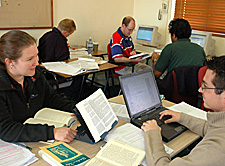 It may seem counter-intuitive, but a 25 per cent reduction in student workload is set to ensure graduates from Moore College are better trained for front-line ministry than ever before.
It may seem counter-intuitive, but a 25 per cent reduction in student workload is set to ensure graduates from Moore College are better trained for front-line ministry than ever before.
“Our standards will be maintained, but we will be using better methods to get there,” says Acting Principal, the Rev Michael Hill.
As part of review of the academic program of the College, education experts from Sydney University were consulted on recent research into teaching methodologies and ‘how people learn’.
The review also surveyed the study habits of current students and the teaching patterns at theological colleges around the world.
“The review has been undertaken as part of ongoing efforts to improve the way we prepare people for ministry and has been driven by research findings,” says Mr Hill.
“The research has convinced us that students will develop a deeper understanding of the material if their workload is reduced and more time is given to reflection on and integration of what is learned.”
But Mr Hill says the reduction in student workload does not mean content has been lost.
“We are being more selective - instead of using 8 examples to teach a concept, use two better chosen ones instead,” he says.
“As always changes to the program have been aimed at preserving the distinctives of the College, including a strong emphasis on the Bible and biblical languages, on theology and on the integration of the two with practical ministry training.”
Some of the changes include new ways of assessing students that are more appropriate to the goals of the particular subject, and new teaching methods that move away from a purely lecture-based delivery.
For the Rev Archie Poulos, head of the College’s Recruitment and Training Department, the curriculum changes are great news for those people considering full-time ministry training but “were scared off because it seemed too hard”.
The College leadership is aware that some prospective ministry students have chosen to go to other theological colleges because of the perceived workload.
With one of the world’s best theological libraries, says Mr Poulos, some Moore students also felt the pressure to be across an impossibly wide breadth of resources.
“We are constantly seeking improved ways of teaching that don’t overwhelm people,” he says.
“We are aiming to teach students the foundations of an education that will be ongoing for the whole of their ministry life. We need to teach our students how to be selective in what they study.”
Mr Poulos has also been closely consulting with Ministry Training and Development about which content may be better taught to ministers through on the job training.
“Like a medical degree, some of the things that we have taught in the past, are best taught while you are doing it,” he says.
Part of Mr Poulos’ job has been to better integrate pastoral education with theology education within the College curriculum.
“There will now be a number of practical tasks set over the 4 years. It could be leading a Crusaders camp - the student will do the task in their church, and then reflect on them in a theological setting,” he says.
In fact, ‘integration’ is probably the key buzzword for the changes.
“The revised program also provides a better integration of Bible, theology and practical ministry,” says Mr Poulos.
“For example, the insights you learn in New Testament will be incorporated into your preaching training.”
“It’s the first time in many years we have been able to rethink every aspect of what we do,” says Mr Poulos.






















